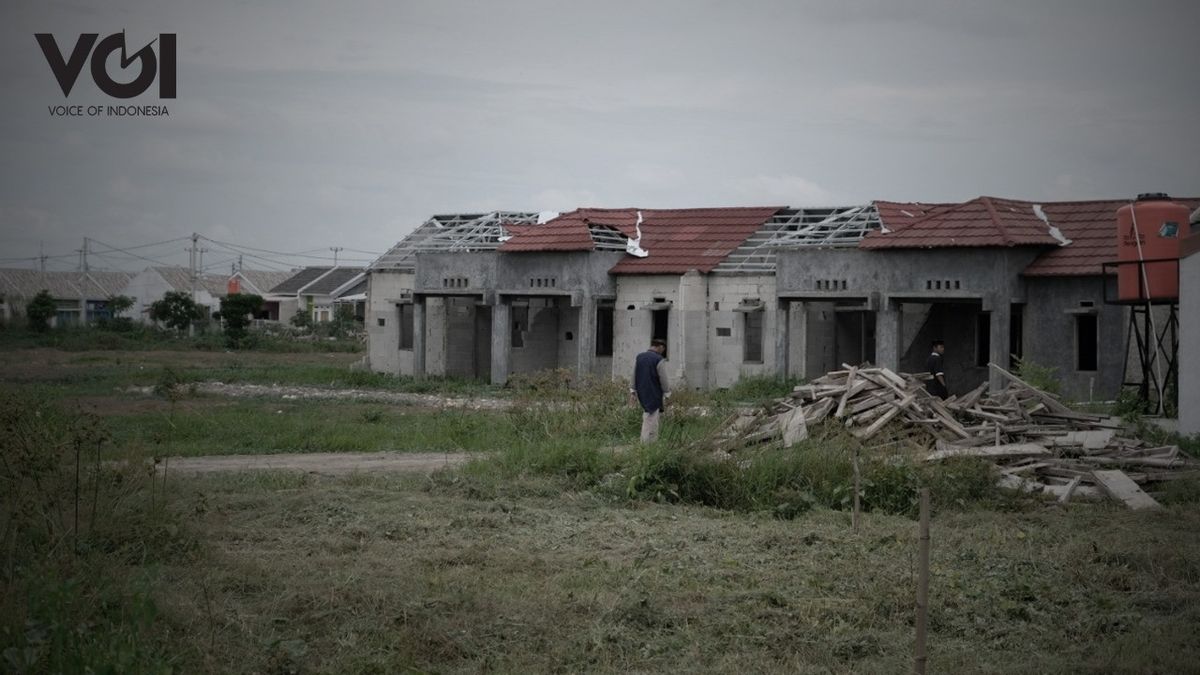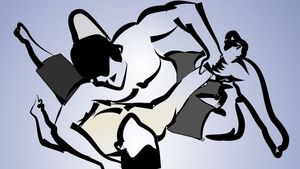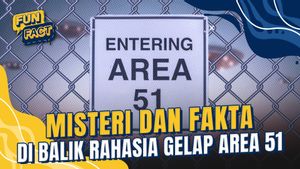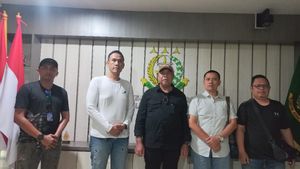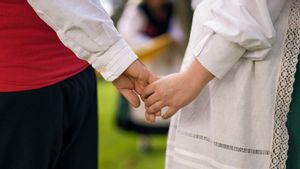Part of the typical VOI Writing Series, "When Was the Board Established?". We have fought the sharia house scams under the guise of "Many Sharia House Frauds, But We Learn How To Avoid Them". In this article, we take a look at life in Kampung Islami Thoyibah in Cibitung, Bekasi, West Java. We will also explore the Yasonna Laoly case with the residents of Tanjung Priok. About the superficial stigma expressed by the minister. Are we where our homes stand?

"People who don't know about Kampung Islami Thoyibah certainly consider this complex to be exclusive because it is inhabited by only fellow Muslims. In fact, for us it is normal. it's only people who exaggerate, ”said Maulana Yusuf to VOI, Thursday, January 30.
At that time, it was Asr, when we met Maulana at his residence in Thoyibah Islamic Village, Kertamukti District, Cibitung, Bekasi, West Java. The 40-year-old man is a former chairman of the local Rukun Tetangga (RT). He sat casually in a shirt and pants that covered all his genitals. To us, Maulana tells about the stigma of Islamic radicalism that leads to him and all other residents of the village.
Life in Thoyibah Islamic Village is indeed interesting. As the name implies, "Kampung Islami", the residents there live according to all the rules that are in accordance with Islamic hadith and the Koran. Some of these include the prohibition of smoking and playing music in residential areas, on the use of the hijab, and the rules for villagers to pray five times a day at the mosque.
In addition, the rules based on sharia in the Tyoyibah Islamic Village also cover the lives of children. Maulana said, every child is educated so that they are not dependent on technology such as smartphones and television. Children are also prohibited from leaving the house when sunset time is off.
"That's because the hadith of the Prophet says, 'Lock your doors and bring the children below in. Because demons roam outside at night. ' Is it wrong for us to live up to the Prophet's hadith? It's not, "said Maulana.
There, we also met a number of children. Farhan Hasan, one of them. Farhan is currently still in grade 2 SD. His school, SDIT Umar Bin Khathab is also in the village area. To us, Farhan admitted that he was fine. He even likes to play without technology. "It's great to be able to play here," said Farhan over the cart crammed with other peers.

Back to Maulana. He tried to convey the villagers' anxiety about the radical stigma that was stamped on the base of their foreheads. The response is that the residents of Kampung Islami Thoyibah are intolerant, for example. Although only Muslims can live in, Maulana said there was never any tendency from the residents of Kampung Islami Thoyibah towards other villagers.
"We do not disbelieve or consider them heretical. We don't exist, Alhamdullilah. It was only via the internet that was exaggerated as if we were intolerant, ”he said.
This tendency is felt to be targeting Maulana and his neighbors. In the early days of village civilization, residents of Kampung Islami Thoyibah were not at home with the many intolerant behaviors they experienced. In their heads, tolerance is living their lives according to their respective beliefs. Even for those who live by Islamic beliefs. Their tendency to hold beliefs becomes a social contradiction in their eyes.
“Please don't smoke, please wear a head scarf, please don't put on the music. That is it. We are only limited to remembering. Nothing more. In fact, there is no compulsion at all. However, those who live here are definitely obliged to be a Muslim ... Anyone who thinks, go ahead. What we hold is faith, "he said.
In addition to the rules and ways of dressing for its residents, Thoyibah Village also has a characteristic, namely the close brotherhood between residents. “The woman wears a veil, the appearance (of men) is beard and shy. For those who just know and see it will feel uncomfortable. However, if they know more deeply, they will see that our brotherhood here is stronger than other housing estates, so that many of them are laymen then buy houses here, "said Maulana.
Get deep into stigma
The social life of this country is indeed filled with stigma. Never mind between residents. Minister of Law and Human Rights (Menkum HAM), Yasonna Laoly got into trouble due to stigma. Last January, the PDIP politician was protested by the residents of Tanjung Priok who were offended by Yasonna's words which went viral on social media. The residents of Tanjung Priok think that Yasonna has carelessly imposed a negative stigma on them.
The case was when Yasonna made a speech at the Class IIA Jatinegara Narcotics Prison, East Jakarta, Thursday, January 16. In his speech, Yasonna explained the strong link between the low level of the economy of a region and the vulnerability to crime committed by residents of that area. And Yasonna made Tanjung Priok an example of that marginalization.
"What makes it big is the existing social diseases. That is why crime is more prevalent in poor areas. Slum areas (slum areas), not in Menteng. Menteng children don't. But, try going to Tanjung Priok, in there are criminals, born out of poverty, "he was quoted as saying by Kompas.com, Thursday, January 16.
Later, Yasonna clarified what he said. He apologized and stated that he did not mean to dwarf the residents of Tanjung Priok. "My statement was not intended to offend the brothers in Tanjung Priok. That later it turned out that it had developed widely with different interpretations in the mass media and the wider public, so that you felt offended, so I apologize," said Yasonna when press conference at the Directorate General of Immigration, written by CNN Indonesia, Wednesday, January 22.
Whatever Yasonna's reason. Regardless of what people think of the residents of Kampung Islami Thoyibah, stigmatization is an old thing that lives in the heads of many Indonesians. As if "you are the place where your house stands". Sociologist at the State Islamic University (UIN) Jakarta, Tantan Hermansyah, gave his view on this stigmatization.
According to Tantan, stigmatization is the general premise of many people who see things in general. The low quality of education is a factor that forms the stigma in the heads of many people in Indonesia. However, this certainly does not apply to a minister like Yasonna. "However, if a minister has the power over data access, that is a problem," said Tantan when contacted by VOI, some time ago.
Reflecting on history
Social life continues to develop. Good things are left out. Including when stigmatization and sensitivity were still unknown. In the past, differences didn't matter. Bhinneka Tunggal Ika is still well understood. Don't talk too far about race. At that time, people of Chinese, Arabic, Indo-Dutch, or genuine natives could build houses according to their respective architectural cultural patterns.
Zeffri Alkatiri's book "Jakarta Has a Way" describes this situation. In an article entitled The Housing Phenomena in Batavia and Jakarta, Zeffri tells how people build houses in various forms according to their respective cultures. "From the outward appearance, we can guess that the house belongs to the Chinese, Arabs, Indo-Dutch, or the local community."
It was explained, the homes of Indonesian-Dutch, middle-class Chinese, or non-Muslim communities were easily recognized because they often posted announcements in front of the house's fence warning "Beware of fierce dogs!" complete with a picture of the Dog sticking out its tongue. This sign was created because in ancient times, almost no Muslim kept dogs.
About the characteristics of the Chinese house, Zeffri explained, this can be seen from the religion he adheres to. For example, being Christian, homeowners will display many pictures of Jesus Christ or accompanied by pictures of the Blessed Mother accompanied by words from the Bible on the walls of their living room. There are different things with those who believe in Kong Hu Chu. Inside the house, they always have an ash table with a display of photos of some of the families who have died.
Even if they weren't there yet, they would hang an incense stick in front of their house to pray - pay respects - every morning and night. “In the past, most Chinese houses were attached to the shop. Some who succeeded then moved to other places. Meanwhile, the shop which is busy and considered lucky is maintained. "
Talking about the characteristics of an Arab house, it's different. They usually have their own characteristics in the form of calligraphy displays or images of the Ka'bah or pictures of Buraq birds. This trait is seen to be numerous, especially among conservative Arabs. "In fact, the house of the Alawyn (Habib) group always displays several photos of famous scholars. This model then affects the surrounding houses, especially those who are Muslim, ”he wrote.
Concerning the house of the Betawi people. At that time, the Betawi people had a collective habit of building houses near water, either rivers or swamps. In addition, the Betawi people, whose population was not so large at that time, tended to build houses in villages filled with trees. Quoted from Abdul Chaer's book entitled Betawi Tempo Doeloe, he explains the spread of the Betawi people until the 1950s. From Ciledug in the west, Tanah Abang and Menteng in the south, to Matraman in the east.
Betawi houses have similarities with the houses of the Sundanese, Javanese or Malay people who live around the Jakarta area. However, the most prominent characteristic of a Betawi house is "... the technique of connecting the poles to the loopers is always reinforced with a kind of bamboo peg. So that if the house is to move, the pen can be removed to be reconstructed in another place. So, makes it easier if the house will be moved because it is without nails, ”he wrote.
Betawi houses have various characteristics. Those who live in the village usually own a very large area of land. It is different from those in urban areas or the suburbs which are blocked by limited land. Another differentiator is the location of the MCK facilities (bathing, washing, toilet).
“In Betawi homes in villages, the toilets are outside the house. Can also be a little away from home. In fact, a house that is located near a river, its toilet facilities are in that river. On the other hand, houses in urban areas where the land is narrow, the toilet facilities are attached to the house, ”he wrote.
Historian JJ Rizal talks about this. He regretted the loss of Betawi villages which had been eroded by the current of development. This caused the original Betawi people to shift to Bogor, Depok, Tangerang, and Bekasi. “Unfortunately, in the context of evictions, space in Jakarta is money. At this point, the struggle for space occurs so that evictions have started to occur among Betawi residents. "
Let us quote one of Ahmad Wahib's most famous poems:
We looked up
To nature and escape
Where pluralism can live
And anti-pluralism finds no space
Where marriage of opinion is not a betrayal
Where disagreement is not distraction
Where the renewal of attitude is not bad
Next Article: "About Those Who Live Away from Jakarta and Spend Life on the Street"
The English, Chinese, Japanese, Arabic, and French versions are automatically generated by the AI. So there may still be inaccuracies in translating, please always see Indonesian as our main language. (system supported by DigitalSiber.id)
